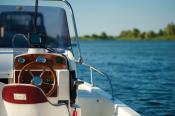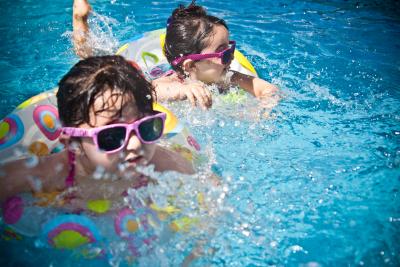May 2019: Water Safety Month
Pool Safety
As Floridians, we know the two types of temperatures in our local climate: hot and not-so-hot! The temperature rising boosts the need to cool off in the water. The Winter Springs Police Department would like to help everyone stay safe this summer around the pool or at the beach with a few rules to keep your summer safe and refreshing.
1. Prevent unsupervised access to the water. Install barriers around your home pool or hot tub. Safety covers and pool alarms should be added as additional layers of protection.
2. Maintain constant supervision. Actively supervise children around any body of water even if lifeguards are present.
3. Ensure knowledge of swimming and water safety skills. Learn how to swim and ensure your children know how to swim as well with lessons.
4. Have a phone close by. When visiting a pool, hot tub, or the beach, your phone nearby and ensure everyone knows how to call 9-1-1 in case of an emergency.
5. If a child is missing, check the water first. Seconds count in preventing death or disability.
6. Create safety instructions and share them with family, friends, babysitters, and neighbors.
If you have a pool, ensure safety by following these tips:
- Install a 4-foot fence around the perimeter of the pool or hot tub, including portable pools. Building codes require adequate pool safety measures.
- Use self-closing and self-latching gates; ask neighbors to do the same if they have pools or spas.
- If your house wall serves as the fourth side of a fence around a pool, install and use a door or pool alarm.
- Maintain all pool and spa covers in good working order.
- Ensure any pool or spa you use has a compliant drain cover; ask for clarification if you do not know.
- Have lifesaving equipment such as life rings, floats, or a reaching pole available and easily accessible.
To view more information about water safety, please visit www.poolsafely.gov or www.redcross.org.

Boating Safety
When taking to the water in boats and personal watercraft, canoes, and kayaks, be sure you have the proper training in their usage and what to do in case of an emergency.
1. Ensure your vessel conforms to U.S. Coast Guard safety standards and that the required safety equipment is aboard and in use. If you are unsure about the safety standards, please visit www.uscgboating.org.
2. Do NOT consume alcohol or drugs while operating a boat, personal watercraft, kayak, or canoe.
3. Know the limitations of your vessel.
4. Ensure all occupants know what to do in case of emergency.
5. Closely monitor weather and water conditions.
Only a community and its police department can form the 360 shield of protection.

